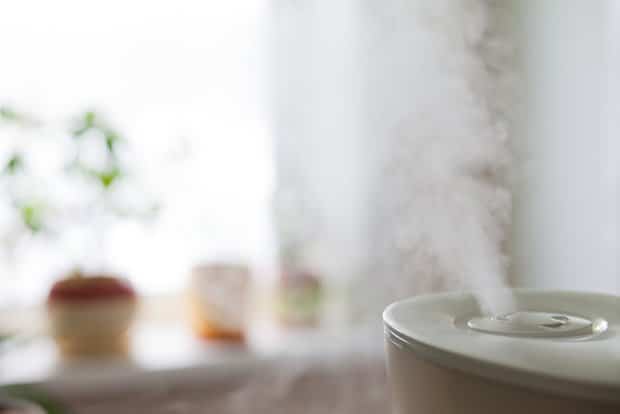
You’ve heard the advice, but you haven’t acted on it. Maybe you just haven’t had the time to go shopping, or you haven’t been convinced that it’s all that important.
What am I talking about?
Getting a humidifier this winter.
If you’re not convinced, consider this: a 2013 study showed that increasing humidity levels to 43 percent or above significantly reduced the ability of airborne viruses to cause flu infections. In fact, in a low humidity environment, 70-77 percent of viruses could transmit the disease through coughs, but when humidity was increased to 43 percent or more, that number dropped to only 14 percent.
An earlier 2009 study showed similar results, with humidity limiting the transmission of the influenza virus. The researchers went so far as to suggest that seasonal low humidity may be the reason why we suffer more viral and bacterial infections in the colder months.
- In other words, a humidifier may help reduce the transmission of cold and flu in the office and in your home. It could mean the difference between getting the flu this winter and remaining healthy.
Here are nine other reasons a humidifier is a good idea:
- Your skin will thank you. Cold, dry air saps moisture from your skin, which causes all kinds of problems, including dryness, dullness, flaking, and accelerated aging. A humidifier can help prevent all these damaging effects, and help you maintain that glowing, vibrant look for all your holiday parties and get-togethers.
- Your nose will thank you. You know that dry, tight feeling you get in your nose in the winter? Even if you don’t have a cold (it’s worse when you do), winter air can dry out your sinuses, lowering your resistance to bacteria and viruses. Sleep with a humidifier and wake up with a more comfortable nose-and throat!
- You’ll suffer for a shorter amount of time. Say you do end up with a cold, a sinus infection, or the flu. A humidifier will shorten your suffering. Keeping your nasal passages and your throat moist will help you heal faster, and will reduce symptoms like coughing and sneezing.
- Your plants will be healthier. Plants help pull toxins out of the air. But they can suffer in dry, winter air. Have you noticed that the soil is dryer than usual? Are the leaves looking droopy and sick? A humidifier can help keep your houseplants healthy-which helps keep you healthy, too!
- You’ll preserve your wood furnishings. Dry air can damage wood furniture, as well as moldings and doors, causing them to split and crack. A humidifier can help preserve the integrity of the wood, maintaining your pieces for years to come.
- Your voice will thank you. Do you often sound like a bear in the mornings? That’s dry air getting to your vocal cords. Sound more like your normal self when you sleep overnight with a humidifier in your bedroom!
- You’ll enjoy a lower heating bill. Did you know that moist air feels warmer than dry air? It’s true. If you add some moisture to the air, it will feel warmer, which can help you save on your heating bills this winter.
- You’ll suffer from fewer shocks. No one likes a static electricity shock-especially not the cat! But you may have noticed that in the winter, it’s harder to avoid it. That’s the dry air again. Use a humidifier and leave the lightning outside.
- You may sleep better. If you or a partner snores, a humidifier may help. We tend to snore more if our sinuses and throats are dry. A moist environment also tends to feel warmer and more comfortable, which can encourage a good night’s sleep.
Some Precautions
While humidifiers are great for you for a number of reasons, they do need to be cleaned regularly. Otherwise, they can become a source of bacteria and mold, which you don’t want floating around your home.
Here are some tips to help:
- Use distilled or demineralized water. This can save you a lot of work. Regular tap water has minerals that create buildup in your machine and promote bacterial growth. Distilled and demineralized water contain fewer minerals and will save you from having to clean as often.
- Clean once a week. If you make this a regular part of your routine, you’ll be able to get it done quickly and will keep your home healthy. Put if off and you’ll face a harder job and risk bacteria and mold buildup.
- Change filters regularly. If your humidifier has a filter, follow the manufacturer’s directions for changing it.
- Too much humidity can be just as problematic as not enough. Use a “hygrometer” (you can find one at home improvement and electronic stores) to measure the humidity in your home. Ideal, as shown by the study, is about 40-50 percent.
Do you use a humidifier in the winter? Please share any tips you may have.
Sources
John D. Noti, et al., “High Humidity Leads to Loss of Infectious Influenza Virus from Simulated Coughs,” PLoS One, February 27, 2013; http://www.plosone.org/article/info%3Adoi%2F10.1371%2Fjournal.pone.0057485.
Jeffrey Shaman, et al., “Absolute humidity modulates influenza survival, transmission, and seasonality,” PNAS, March 3, 2009; 106(9): 3243-3248, http://www.pnas.org/content/106/9/3243.abstract.
Photo courtesy marin via freedigitalphotos.net.

